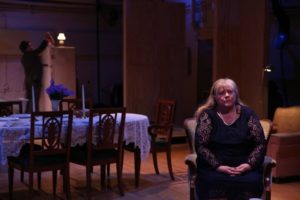 I’m thrilled to announce that Houston’s Alley Theatre, one of America’s finest regional companies, is presenting Satchmo at the Waldorf, my first play, next season. The production will be a remount of the second staging of Satchmo, directed by Gordon Edelstein, which to date has been presented off Broadway and at Shakespeare & Company of Lenox, Mass., New Haven’s Long Wharf Theatre, Philadelphia’s Wilma Theater, the Wallis Annenberg Center for the Performing Arts in Beverly Hills, San Francisco’s American Conservatory Theatre, and Colorado Springs’ Theatreworks.
I’m thrilled to announce that Houston’s Alley Theatre, one of America’s finest regional companies, is presenting Satchmo at the Waldorf, my first play, next season. The production will be a remount of the second staging of Satchmo, directed by Gordon Edelstein, which to date has been presented off Broadway and at Shakespeare & Company of Lenox, Mass., New Haven’s Long Wharf Theatre, Philadelphia’s Wilma Theater, the Wallis Annenberg Center for the Performing Arts in Beverly Hills, San Francisco’s American Conservatory Theatre, and Colorado Springs’ Theatreworks.
Satchmo begins previews in Houston on March 2, 2018, then runs from March 7 through March 25. For more information about the production, go here.
In case it’s slipped your mind, Satchmo at the Waldorf will also be performed this summer by Triangle Productions of Portland, Oregon, opening there on May 4 and running through May 27. For more information about that production, which stars Salim Sanchez, go here.

 William Inge was a theatrical giant whose artistic stature is no longer as widely acknowledged as it ought to be. Fortunately, his plays have started to be revived with increasing frequency in New York and throughout America, and the Transport Group, which specializes in innovative off-Broadway productions of new and old American plays, is now mounting an Inge mini-festival. The company is presenting “Come Back, Little Sheba” and “Picnic,” Inge’s first two plays, in rotating repertory at the Gym at Judson, a downtown avant-garde performance space. That may seem like a stretch for a writer who knocked out four Broadway hits in a row between 1950 and 1957, all of which were turned into successful Hollywood movies. But Inge was no mere confectioner of cozy melodramas for the carriage trade: He was a soft-spoken poet of small-town loneliness and despair, and these revivals, staged by Jack Cummings III and acted by a first-class ensemble cast—14 actors, five of whom appear in both shows—will leave you in no doubt that he was one of America’s half-dozen greatest playwrights….
William Inge was a theatrical giant whose artistic stature is no longer as widely acknowledged as it ought to be. Fortunately, his plays have started to be revived with increasing frequency in New York and throughout America, and the Transport Group, which specializes in innovative off-Broadway productions of new and old American plays, is now mounting an Inge mini-festival. The company is presenting “Come Back, Little Sheba” and “Picnic,” Inge’s first two plays, in rotating repertory at the Gym at Judson, a downtown avant-garde performance space. That may seem like a stretch for a writer who knocked out four Broadway hits in a row between 1950 and 1957, all of which were turned into successful Hollywood movies. But Inge was no mere confectioner of cozy melodramas for the carriage trade: He was a soft-spoken poet of small-town loneliness and despair, and these revivals, staged by Jack Cummings III and acted by a first-class ensemble cast—14 actors, five of whom appear in both shows—will leave you in no doubt that he was one of America’s half-dozen greatest playwrights…. Simplicity and intimacy are the keys to these stagings, which are presented in a converted gymnasium before an audience of 85, most of whose members are close enough to the actors to be able to reach out and touch them. Storytelling is all: Mr. Cummings lets his actors go about their business without pasting a high directorial concept on top of either script. “Sheba” is played in the round on a stage full of shabby furniture, while the “set” for “Picnic” consists of three unpainted wooden flats and seven cheap, rusty metal lawn chairs. The acting is as naturalistic as are Ásta Bennie Hostetter’s penny-plain period costumes, and the playing area is small enough that nobody has to exaggerate: It’s as though you’ve stopped by for a visit, inadvertently arriving in the middle of a family crisis….
Simplicity and intimacy are the keys to these stagings, which are presented in a converted gymnasium before an audience of 85, most of whose members are close enough to the actors to be able to reach out and touch them. Storytelling is all: Mr. Cummings lets his actors go about their business without pasting a high directorial concept on top of either script. “Sheba” is played in the round on a stage full of shabby furniture, while the “set” for “Picnic” consists of three unpainted wooden flats and seven cheap, rusty metal lawn chairs. The acting is as naturalistic as are Ásta Bennie Hostetter’s penny-plain period costumes, and the playing area is small enough that nobody has to exaggerate: It’s as though you’ve stopped by for a visit, inadvertently arriving in the middle of a family crisis….
